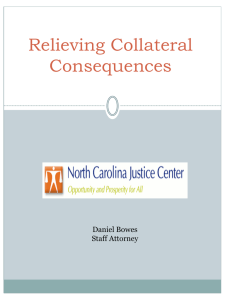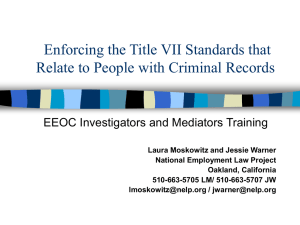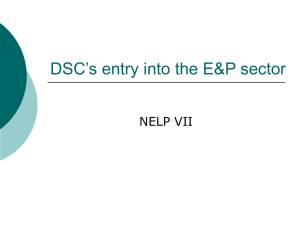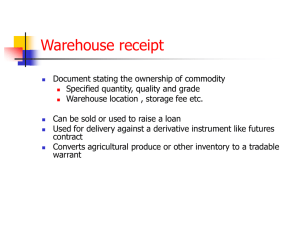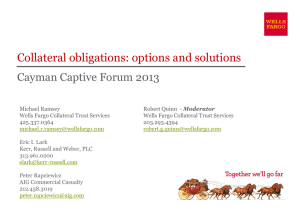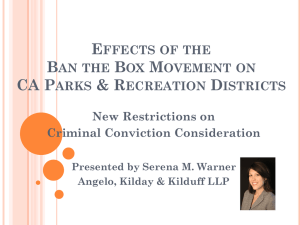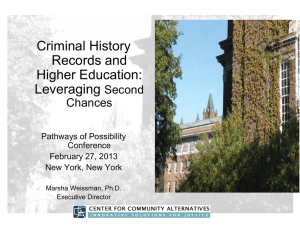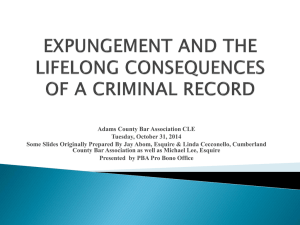9 25 12 State Collateral Consequences Webinar RB Final
advertisement
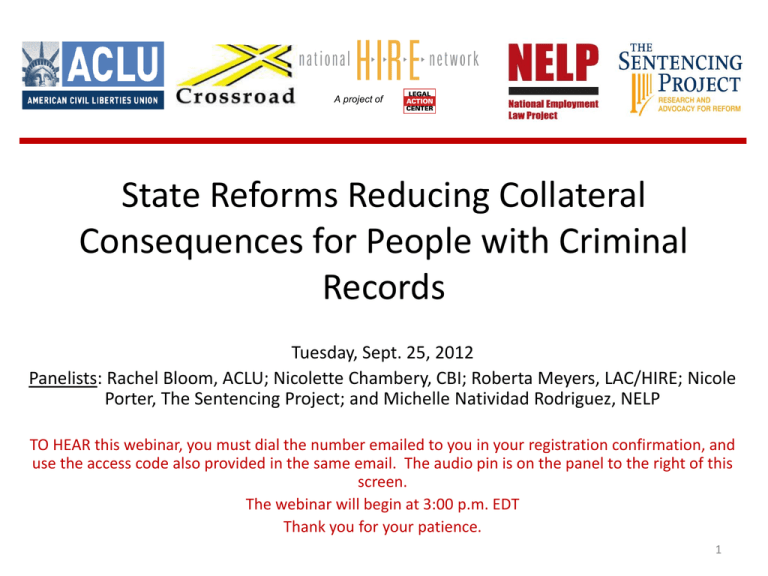
A project of State Reforms Reducing Collateral Consequences for People with Criminal Records Tuesday, Sept. 25, 2012 Panelists: Rachel Bloom, ACLU; Nicolette Chambery, CBI; Roberta Meyers, LAC/HIRE; Nicole Porter, The Sentencing Project; and Michelle Natividad Rodriguez, NELP TO HEAR this webinar, you must dial the number emailed to you in your registration confirmation, and use the access code also provided in the same email. The audio pin is on the panel to the right of this screen. The webinar will begin at 3:00 p.m. EDT Thank you for your patience. 1 Guidelines If you choose to use your telephone to listen to the webinar, please make sure to mute yourself for the entire length of the webinar including questions. If you choose to use your telephone to listen to the webinar, please make sure your computer speakers are off, if not it will cause you to hear an echo. Can’t hear the presentation? Dial 646-307-1716 When prompted, use the access code provided in your registration email. The audio pin is on the panel to the right of this screen. Having technical difficulties? Call 212-243-1313 for assistance. 2 Collateral Consequences of a Criminal Conviction Collateral consequences are the additional penalties tied to a conviction that greatly impact an individual’s capacity to engage politically, economically and socially upon their reentry to society. These consequences include barriers to housing, education, and employment, felony disenfranchisement, and ineligibility for public benefits. Collateral consequences are distinct from direct consequences of convictions in that they are not factored in to the calculation of punishment or sentencing, and are triggered outside the jurisdiction of the courts. 3 The Growing Impact of Collateral Consequences As the U.S. prison population grows, so do the number of individuals impacted by collateral consequences. The American Bar Association has identified over 38,000 collateral consequences. Approximately 19.8 million Americans have a felony conviction, 8.6% of the adult population. An estimated 65 million Americans have a criminal record. 4 Momentum for Reform Growing awareness of the negative impact of collateral consequences. Bills to advance a proactive agenda were introduced in approximately half of all state legislatures in 2012. Strong bipartisan support for reforming collateral consequences. 5 Agenda Federal Opt Out (Roberta Meyers, LAC/HIRE) Negligent Hiring (Roberta Meyers, LAC/HIRE) Ban the Box (Michelle Natividad Rodriguez, NELP) Expungement (Nicole Porter, The Sentencing Project) Felony Enfranchisement (Nicole Porter, The Sentencing Project) Universal Collateral Consequences of Conviction Act (Nicolette Chambery, Crossroad Bible Institute) Q&A (Rachel Bloom, ACLU) 6 State Reforms Reducing Collateral Consequences for People with Criminal Records National H.I.R.E. Network Webinar Tuesday, September 25, 2012 Roberta Meyers Director rampeeples@lac.org Restoring Eligibility for Public Benefits Drug felony ban on Supplemental Nutrition Assistance Program (SNAP) and Temporary Assistance to Needy Families (TANF) 12 States have fully opted out (DE, KS, ME, NH, NJ, NM, NY, OH, OK. PA, RI, VT) 7 States have full ban (AL, AK, GA, MI, SC, TX, WV) 32 States have a limited (modified) ban on SNAP or TANF SNAP: 15 States plus DC—No Ban TANF: 14 States—No Ban **4 States introduced measures to increase access to benefits (AL, CA, MO, PA) ***5 States adopted measures to reduce access to benefits through drug testing (GA, OK, TN, UT, and WV) 8 Employer Negligent Hiring Protections Why a policy consideration? Negligent hiring liability is one of the top reasons employers say they may not hire an individual with a criminal record. A new policy that offers additional and overt protections to employers may increase employment opportunities for job seekers with criminal histories. 9 State Negligent Hiring Policies Colorado: C.R.S. § 8-2-201(2)(a) restricts information at trial Florida: FL. Stat. Ann. §768.096 presumption against negligent hiring with adequate background investigation Massachusetts: 6 Mass. Gen. Law. 172(e) safe harbor attached to CORI (long term care facilities) New York: N.Y. Exec. Law § 296(15) rebuttable presumption North Carolina: N.C. Stat. § 15A-173.5 limited liability attached to certificate Ohio: immunity from negligent hiring of employee with certificate CO, MN, NJ, NY, VT, WV, and WI—new proposals introduced but not passed 10 Resources Advocacy Toolkits to Combat Legal Barriers Facing Individuals with Criminal Records: http://www.lac.org/toolkits/Introduction.htm Make Your Voice Heard: Guidelines for Effective Advocacy: http://www.hirenetwork.org/content/make-your-voice-heard-guidelines-effective-advocacy ABA National Collateral Consequences Inventory: http://www.abacollateralconsequences.org/CollateralConsequences/index.html 11 “Ban the box”: Fair Hiring and Occupational Licensing Standards National Employment Law Project September 25, 2012 Michelle Natividad Rodriguez Staff Attorney mrodriguez@nelp.org www.nelp.org 12 “Ban the Box:” Restoring Hope and Opportunity to Workers with Criminal Records • Benefits to worker: remove chilling effect, decrease stigma, demonstrate qualifications • Benefits to employers: maximize applicant pool and can reduce resource expenditure www.nelp.org 13 State Coverage & Inquiry California (2010) Executive Policy Public Employment Colorado (2012) HB 1263 Public Employment/Licensing (checked when finalist or conditional offer) Public Employment/Licensing Boards (checked when otherwise qualified) Must consider nature of offense Cannot consider arrest that did not & relationship to job, age of lead to conviction, limits offense, rehabilitation consideration of expunged offenses. Hawaii (1998) HRS Sections 378-2, 378.2.5 Private and Public Employment (checked when conditional offer of employment) Criminal record must bear a “rational relationship” to the job Massachusetts (2010) Ch. 256 of Acts 2010 Private and Public Employment (checked when finalists selected) Minnesota (2009) Minn.Stat., Section 364, et seq. Public Employment (checked when selected for interview) Requires convictions to be “job related” for public employment and licensing purposes, and consider rehabilitation New Mexico (2010) N.M. Stat. Section 28-2-3 Public Employment (checked when finalists selected) Conviction must be “substantially related” to the job Connecticut (2010) HB 5207 Screening Criteria Other Protections Must consider nature of offense Written statement of reasons for & relationship to job, rejection. rehabilitation, age of offense Employers may not consider felonies over 10 years (excluding incarceration) Employers may not consider felonies over 10 years and misdemeanors over 5 years www.nelp.org Cannot consider arrest that did not lead to conviction, expunged offenses and misdemeanors not involving jail time. 14 Success! Colorado HB 1263 Prohibits state agencies and licensing agencies from performing a background check until finalist or conditional offer. Must consider: (1) nature of conviction; (2) direct relationship of conviction to job; (3) rehabilitation and good conduct; and (4) time elapsed. Prohibits use of arrests not leading to conviction. No disqualifications based on expunged/dismissed unless agencies first consider factors. Exempt: statute bars, certain public safety or correction-related jobs. Voluntary information can be considered. Prohibits blanket ban ads. Supported by Colorado Criminal Justice Reform Coalition. www.nelp.org 15 Introduced Legislation in 2012 1. 2. 3. 4. 5. 6. 7. California AB 1831 Illinois HB 1210, Amd. No. 1 Maryland SB 671/HB 800 Minnesota HF 1448/SF 1122 New Jersey A2300 Rhode Island HB 1160, SB 241 Vermont H717 www.nelp.org 16 Highlights of Introduced Legislation California: applied to city and county employment Illinois: now an even stronger bill with House Cmte. Amd. No. 1 Maryland: significant that garnered support from powerful state agency www.nelp.org 17 Highlights of Introduced Legislation Minnesota: applied to private employment New Jersey: penalty for violation is $10,000 for first offense and $20,000 for second offense Rhode Island: must be “direct causal relationship” between offense and license/employment Vermont: first attempt www.nelp.org 18 Resources 65 Million Need Not Apply: The Case for Reforming Criminal Background Checks http://www.nelp.org/page//SCLP/2011/65_Million_Need_Not_Apply.pdf?nocdn=1 State Ban the Box Guide http://www.nelp.org/page//SCLP/ModelStateHiringInitiatives.pdf?nocdn=1 www.nelp.org 19 Changes in State Collateral Sanctions Policies The Sentencing Project Nicole D. Porter Director of Advocacy nporter@sentencingproject.org Expungement and Sealing: Reducing Employment Barriers • 2012, at least 8 states - Delaware, Georgia, Louisiana, Ohio, Maryland, North Carolina, Tennessee and Utah—adopted measures that authorize or expand expungement relief for criminal convictions. • At least 8 other states, including Alabama, Florida, Kentucky, Louisiana, Missouri, New Jersey, New York and Rhode Island, introduced expungement provisions during 2012 • 3 measures -- in New Mexico, South Carolina, and West Virginia—were adopted by the legislature, but vetoed by the governor • 2012: Delaware’s House Bill 9 • 1997-2010: 23 states enacted reforms to disenfranchisement policy • 800,000 citizens regained voting rights Introduced Legislation to Enact the Uniform Collateral Consequences of Conviction Act Crossroad Bible Institute Nicolette Chambery Advocacy Coordinator nicolette@cbi.fm UCCA Background • The Uniform Collateral Consequences of Conviction Act was written in response to the increasingly high number of men and women that were unable to find housing, employment, and access to public benefits, upon their release from prison. • Recognizing these and other missing opportunities as imperative to a successful reentry, this act provides information and relief to attorneys, their clients, and the public that equips them with tools that mitigate these effects. • Though no state has enacted UCCA, advocates are confident that progress made in past years will continue into next year. 2011 Introduced Legislation • North Carolina • New Mexico • Colorado • Minnesota • Vermont • Nevada • West Virginia 2012 Legislation • New York Assembly Bill 8546 – The partisan divide between Assembly Members and the Senate remains to be a barrier in passing this legislation and concern for adopting a policy too soft on crime. – Reentry reforms have been adopted on smaller scales and Assembly Members are hopeful this practice will continue to enact UCCA. – This bill is being revised to accommodate existing relief mechanisms already in place, and will be reintroduced next session. 2012 Legislation • Vermont Senate Bill 38 – This measure gained significant ground last session, and supporters of this bill are confident they have extinguished concerns surrounding its enactment. – This bill will be reintroduced next year. – Advocates are hopeful the ABA study of which collateral consequences attach to a particular statute will be a great resource in the passage of this bill. The first 9 states are available on the National Inventory of Collateral Consequences of Conviction website. 2012 Legislation West Virgina House Bill – This bill was originally recommended by the Joint Standing Committee on the Judiciary, though no action was taken and it never received a hearing. Wisconsin Senate Bill 304 – Senate Bill 304 also did not receive a hearing due to opposition from the Chair with specific concerns over public safety. 2012 Legislation • Minnesota House Bill 489/Senate Bill 1448 – Though great progress continues to be made, some legislators have yet to embrace criminal justice reform. – Advocates for this measure are meeting in late September to determine new strategies for raising awareness and support for this bill to accommodate concerns from lawmakers. A project of Contact Information Rachel Bloom rbloom@aclu.org www.aclu.org Nicole Porter nporter@sentencingproject.org www.thesentencingproject.com Nicolette Chambery nicolette@cbi.fm www.cbi.fm Michelle Natividad Rodriguez mrodriguez@nelp.org www.nelp.org Roberta Meyers rampeeples@lac.org www.hirenetwork.org 30
